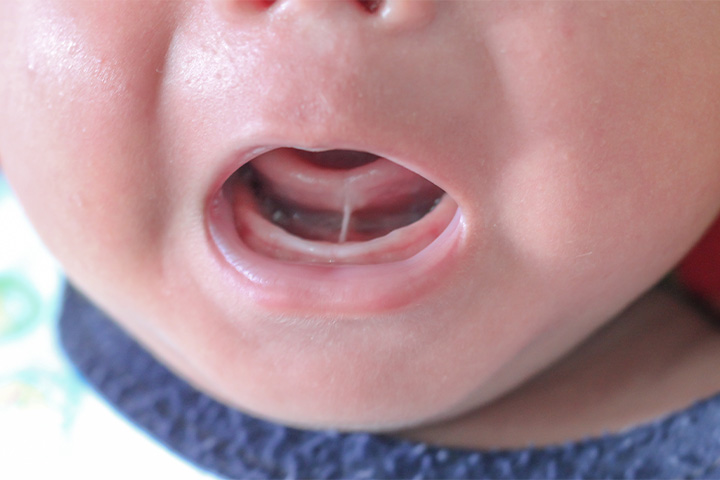Home » CO2 Laser Release | Lip Tie Infants | Tongue Tie Infants

Infants that are unable to feed properly could have a lip or tongue tie. These conditions restrict the movement of their oral tissues. Babies with one of these problems may find it difficult to feed properly. Some parents are unfamiliar with these issues and as their child grows older, complications with speaking and chewing become more obvious. Fortunately, CO2 laser release is a procedure that uses a soft tissue laser to gently bring about freedom for your baby’s smile.
To learn more about laser lip and tongue tie release for infants and children in Lexington, read on below or call our friendly team of expert dentists at Lexington Smile Studio.

A tongue tie occurs when the lingual frenulum, which connects the tongue to the floor of the mouth, is too short or thick. A lip tie happens when the frenulum between the lip and gums is too short or thick. These issues can limit movement of the oral structures and lead to several complications.
Before birth, the frenulums should separate naturally. However, there are instances when they do not. The reason is unknown, but some researchers suggest it could be hereditary. Certain nutritional deficiencies during pregnancy may also play a role in the development of these conditions.
Here are some signs that your infant or child may have a lip or tongue tie:

The lips and tongue are very important. They help babies and children to feed, learn to speak, maintain oral health, and live a quality life. Lip and tongue ties can restrict a growing child in the following ways:
Feeding – Infants naturally know how to suck for milk. However, the restraint of tongue tie makes sucking difficult for them. They have to force the action more, which causes stress and prevents them from consuming enough milk. Needless to say, your baby is losing nutrition and not developing as they should.
Speech – As your baby gets older and starts to learn words, lip or tongue tie will make speaking challenging. Some words will be difficult to pronounce, and your child will not speak clearly.
Oral Hygiene – Untreated tongue tie can cause issues like tooth decay and gum disease due to the lack of mobility. Your tongue naturally helps keep teeth clean. And when the tongue is positioned correctly, the teeth are more likely to develop correctly without gaps or spaces.
Overall Interference – As your baby grows into a wandering child and later an adult, they will have limitations. Enjoying lollipops, ice cream, public speaking, and romantic relationships may be challenging.

The best way to treat a lip or tongue tie in infants and children is via a minimally invasive surgical procedure known as a frenectomy. It takes just a few minutes. During this brief service, we use a CO2 laser to modify or remove the frenulum that is causing trouble for your child. The laser sterilizes the area and is surprisingly comfortable, so your child should have an easy treatment experience. Infants are encouraged to breastfeed immediately after a frenectomy.
Choosing to neglect your child’s lip or tongue-tie can create additional problems for them as they get older, including:
When treating a lip or tongue-tie, there is no age minimum for children. This procedure can even be performed days after a baby is born in many cases; however, it may not be discovered until several months go by. As soon as you discover that your little one is struggling to nurse or take a bottle, though, you’ll need to call our office right away. The sooner we identify the problem, the better the chances of treating it and improving your child’s ability to eat.
When administering this type of treatment to an infant, we will make sure they remain comfortable throughout the procedure. This means that our team will take a swaddle approach. It’s best if we wrap them up tightly in a swaddle so they remain warm, calm, and unable to move their arms and legs – a factor that ensures their safety and ours as we carefully release the banded tissue.
While swaddled, a member of our team will make sure they feel at ease throughout the process. As soon as we are finished, you will be able to re-enter the room and immediately begin caring for your little one.
As a parent watching your little one undergo this type of procedure, it can be hard to hear them cry before, during, and after the procedure. However, the reason for their tears is usually not because of any pain they are experiencing but instead, it’s because they do not want their lip or tongue behind held. Babies have no other way to express their emotions other than crying.
When hearing your baby cry from the other room, do not fear. This doesn’t mean that something is wrong, or they are in pain. We understand how important your little one is and that placing them in our trusted hands isn’t easy. You can rest assured, though, that we will do everything we can to work quickly while maintaining a gentle touch. By having your baby undergo this procedure, you will be doing them a great favor as they get older.


The New York Times has published “Inside the Booming Business of Cutting Babies’ Tongues” on December 18th, 2023. At Lexington Smile Studio, we are glad that attention is brought to this topic, as there has been an overwhelming number of providers who have recently started doing lip and tongue tie releases, and treat these procedures as a business only.
At Lexington Smile Studio, we have been providing these services for more than 10 years working in close collaboration with lactation consultants, speech-language pathologists, occupational therapists, myofunctional therapists and pediatricians. We are not a one stop practice.
Dr Rosenberg first and now Dr McElligott have been caring for infants and their mothers for a long time with dedication, empathy, understanding and teamwork with the other specialists involved. As Dr McElligott explains to parents during consultations, this is a process not a procedure.
Our success has been based over the years on word of mouth from the families we have treated. Our success is the magnitude of babies who are now thriving because of the release they received by us and, just as importantly, the magnitude of babies who didn’t receive it, simply because we directed the families to the right specialists.
We truly care for all parents and their infants’ well being and we hope that this article will raise public awareness so that families will put their babies in the hands of the right providers.
The Staff and Doctors at
Lexington Smile Studio